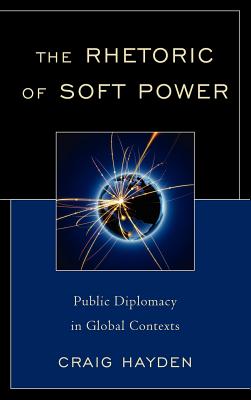The Rhetoric of Soft Power: Public Diplomacy in Global Contexts provides a comparative assessment of public diplomacy and strategic communication initiatives in order to portray how Joseph Nye’s notion of “soft power” has translated into context-specific strategies of international influence. The book examines four cases—Japan, Venezuela, China, and the United States—to illuminate the particular significance of culture, foreign publics, and communication technologies for the foreign policy ambitions of each country. This study explores the notion of soft power as a set of theoretical arguments about power, and as a reflection of how nation-states perceive what is an increasingly necessary perspective on international relations in an age of ubiquitous global communication flows and encroaching networks of non-state actors. Through an analysis of policy discourse, public diplomacy initiatives, and related programs of strategic influence, soft power in each case represents a localized set of assumptions about the requirements of persuasion, the relevance of foreign audiences to state goals, and the perception of what counts as a soft power resource. This timely analysis provides an unprecedented comparative investigation of the relationship between soft power and public diplomacy.
The Rhetoric of Soft Power: Public Diplomacy in Global Contexts provides a comparative assessment of public diplomacy and strategic communication initiatives in order to portray how Joseph Nye’s notion of “soft power” has translated into context-specific strategies of international influence. The book examines four cases—Japan, Venezuela, China, and the United States—to illuminate the particular significance of culture, foreign publics, and communication technologies for the foreign policy ambitions of each country. This study explores the notion of soft power as a set of theoretical arguments about power, and as a reflection of how nation-states perceive what is an increasingly necessary perspective on international relations in an age of ubiquitous global communication flows and encroaching networks of non-state actors. Through an analysis of policy discourse, public diplomacy initiatives, and related programs of strategic influence, soft power in each case represents a localized set of assumptions about the requirements of persuasion, the relevance of foreign audiences to state goals, and the perception of what counts as a soft power resource. This timely analysis provides an unprecedented comparative investigation of the relationship between soft power and public diplomacy.
Get The Rhetoric of Soft Power by at the best price and quality guranteed only at Werezi Africa largest book ecommerce store. The book was published by Bloomsbury Publishing Plc and it has pages. Enjoy Shopping Best Offers & Deals on books Online from Werezi - Receive at your doorstep - Fast Delivery - Secure mode of Payment
 Jacket, Women
Jacket, Women
 Woolend Jacket
Woolend Jacket
 Western denim
Western denim
 Mini Dresss
Mini Dresss
 Jacket, Women
Jacket, Women
 Woolend Jacket
Woolend Jacket
 Western denim
Western denim
 Mini Dresss
Mini Dresss
 Jacket, Women
Jacket, Women
 Woolend Jacket
Woolend Jacket
 Western denim
Western denim
 Mini Dresss
Mini Dresss
 Jacket, Women
Jacket, Women
 Woolend Jacket
Woolend Jacket
 Western denim
Western denim
 Mini Dresss
Mini Dresss
 Jacket, Women
Jacket, Women
 Woolend Jacket
Woolend Jacket
 Western denim
Western denim
 Mini Dresss
Mini Dresss






























































